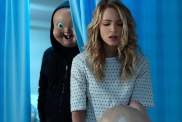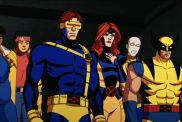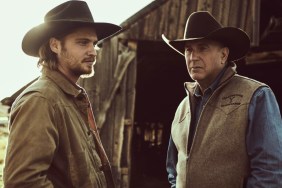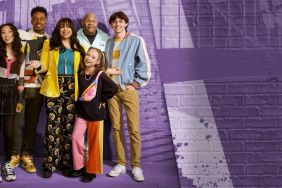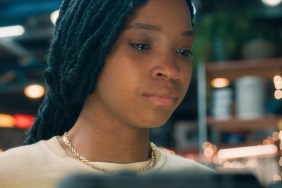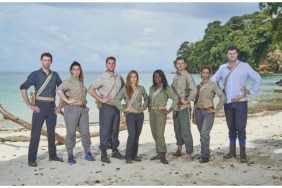
Every year, the Sundance Film Festival premieres dozens of great independent films, many that often have to struggle to find an audience in theaters. When James Strouse’s Grace is Gone, starring John Cusack, won the coveted Audience Award in 2007, it was thought Strouse would be a filmmaker to watch. For whatever reason, the movie failed to make a mark when The Weinstein Company released it later that year. Undaunted, Strouse returned to Sundance in January 2009 with his follow-up The Winning Season, a very different movie that involves sports and even a bit of humor.
It stars perennial Sundance man Sam Rockwell as Bill, a divorced alcoholic working as a busboy in a restaurant until his friend, played by Rob Corddry, asks him to coach his high school’s girls’ basketball team, because he thinks Bill could turn them around. Before you can say “Bad News Bears,” Bill is putting the team, made up of Emma Roberts’ Abbie, Shareeka (Half Nelson) Epps’ Lisa, as well as Rooney Mara, Emily Rios and Meaghan Witri, through rigorous paces to try to make them the best team in the league. Along the way, he helps the girls with their problems and they do the same for him.
Last year at the Sundance Film Festival, ComingSoon.net sat down with James Strouse, Sam Rockwell, Rob Corddry, Emma Roberts and Shareeka Epps for a rousing interview. It was easily one of the oddest combination of actors we’ve ever interviewed at the same time, but we did the best we could as Corddry had everyone cracking up so much it was hard to maintain any sort of decorum.
ComingSoon.net: I guess we’ll start with you, James, since as with most movies, this started with you. “Grace is Gone” was a big hit at Sundance a few years back. Why did you want to do a basketball movie and a comedy and go in such a different direction with this one?
James Strouse: I just wanted to go in a completely different – not that it’s completely different direction. I think this film has a nice balance of both comedy and drama but I really wanted to do something funny. It was great to take the drama and go through that, but the whole time, I was thinking, “Man, I want to do something a little more comedic, more like a comedy/drama.”
CS: But why did you want to set it in the world of basketball, since that’s a whole new set of challenges?
Strouse: (“Grace is Gone”) was just three people and that story was really simple, just three characters for the whole time, and I wanted to do something with more characters, more plots and subplots, and more action. That was a very restrained people, and the whole time I was like, “I would like to move the camera more, that would be fun I think.”
CS: Emma, you had done a bunch of studio movies and this is more independent for you, so what was it about this that made you want to do it?
Emma Roberts: I thought the script was really cool, and it was a movie that had basketball in it, but it’s not like a basketball movie. It’s about so much more than that. I met Jim and I really liked him, I thought he was a cool guy, and Sam was attached to do it, and I’ve known Sam for a very, very long time, and I definitely wanted to work with him. It just seemed like it would be a really great project.
CS: Had you ever played basketball before or did you have any kind of experience playing it?
Roberts: No, it was funny because there were five of us and we were all just completely opposite on the spectrum when it comes to skill levels. Some of us were really good, and some of us had never picked up a ball before, and then there was some in-between, so it was funny when we were practicing getting together as a team and just figuring out skill level and trying to improve.
CS: There must have been a few ringers in there.
Strouse: Emily Rios was…
Roberts: Amazing.
Strouse: I don’t think she ever missed a shot.
Roberts: She was really good.
Rob Corddry: Doesn’t she have a full boat scholarship or something pending?
CS: For basketball?
Strouse: I think her two loves in life were acting and basketball, and she left basketball for acting, so we were all thrilled to have her on the movie to combine those two things, it was great.
Roberts: Shareeka was good, too. I think me and Rooney were worse.

CS: So Shareeka, you’re coming off “Half Nelson” which you got a lot of attention for. It’s been a few years, and I think when I spoke to you back then, you were still in school. What was it about this that made you want to do it?
Shareeka Epps: Of course, after “Half Nelson” I think we spoke about that, I had much more of a passion for acting and that’s what I wanted to pursue, and I love great scripts. I want to be a director someday, so he kind of inspired me during this whole thing also. Jim just wrote a great script. It was an amazing script. I loved how it wasn’t just focused on a coach and one person, but it was focused on everyone being a team, and the progress of us growing through our strengths and weaknesses, and I think that’s what drew me to it, pretty much.
CS: Yeah, that’s somewhat surprising that it is such an ensemble cast, especially after seeing you in “Moon,” Sam, where you’re literally the whole movie.
Sam Rockwell: The narcissist rests.
CS: And Sam, what interested you in this because you always have interesting taste in scripts?
Rockwell: Oh, I was really excited for the opportunity. I mean, I love ensembles, but just the craziness of six girls and a guy, it’s such a great dynamic. And it’s not like girls’ sports stories, if you think about it. I thought it was an exciting prospect… (points to Rob Corddry) And this guy…
Corddry: “Personal Best” is a great girls’ sports film.
Rockwell: There you go, exactly.
CS: “Love and Basketball”?
Epps: That’s where I got my follow-through from. (laughs)
CS: Did any or all of you watch any basketball movies to prepare for this like “Hoosiers”?
Roberts: We watched “Heart of the Game”…
Rockwell: We watched that documentary.
Roberts: What was the other one?
Epps: “Class C” (everyone repeats this one)
Strouse: “Class C” is a documentary that’s not out actually.
Roberts: But it was really good, it’s so sad.
Strouse: It was about high school basketball in Montana.
Epps: It’s their whole life, it’s very sad.
Rockwell: “A League of Their Own” is a good one, too.
CS: Right, in terms of tone. I was wondering about “Heart of the Game” because when I watched it, I thought maybe this was dramatic retelling of that story. Had you seen that film before doing this?
Strouse: Oh, yeah. I love that film. It’s a great documentary.
Roberts: We all had it on DVD and we were all watching it.
CS: I thought they were trying to make a dramatic version of that story.
Rockwell: We beat them to it.
CS: Yeah, you probably made it impossible for them to do that now, so how about you, Rob? You’ve done so many comedies and you do have a comedic role in this as the principal, but I would say this is a little different. Would you say so?
Corddry: Absolutely, yeah, yeah. That’s what I was excited about that there was enough of both to make it interesting. (At this point, Emma gets grossed out by something Sam is doing, and they all break into laughter, which interrupts Corddry’s answer.) We’re talking about me right now.
CS: Sorry, Rob, back to you…
Corddry: I’m great, I’m good… sorry, what were we talking about again?
CS: We were just talking about how different this role was for you and what that experience was like. Also, you and Sam are really the only adults in the movie with the young actresses, so what was that like? Either one of you can answer (long awkward pause)… or neither. I can just go back to James and ask him…
Roberts: Rob doesn’t know the question. (laughs)
Corddry: Yeah, the question is…
Strouse: A lot of Rob’s scenes actually were with Sam.
Corddry: My scenes are only with Sam. Every time I interacted with the girls, I really kind of felt like they hated me. (everyone laughs) I’m either being a dork or depriving them of their coach, so there’s animosity towards my character, but I really felt like they just kind of hated me.
Roberts: Oh, we did not!
Corddry: They’d say “cut” and they’d go, “You’re such jerk.” (Sam laughs at this)

CS: Even though you’re sort of the antagonist of the piece, I don’t think you’re ever really hated.
Rockwell: Yeah, You love your daughter and your heart’s in the right place.
Strouse: I love that role, man. It’s not a bad guy. You look at his zeal for the team and his daughter, and there’s a lot of heart to him, but he’s really flawed in some funny ways.
CS: I think people watching this movie might wonder why you hired Sam’s character to coach in the first place.
Corddry: Yeah, do you want to hear my subtext? It’s going to be like 25 minutes.
CS: Well, we only have 20, so can you do the soundbyte version of your subtext?
Corddry: Yeah, I can. He was probably the fifth to tenth person I went to. I knew he’s a great coach but I knew that his faults probably outweighed the benefits, but I thought that if I can get this girls’ team together my first year as principal and have a winning season, that would make me look good. We play basketball together and have always had a very contentious relationship, and he always kind of rips the rug out from under me. Like in our first scene, he goes, “You’re the principal now, that sounds boring,” and I imagine he’s been doing that for the last 20 years to me, and I’m like “What am I doing here?” It’s almost confirmed right off the bat that I should not have asked him to coach the team.
Rockwell: “I changed my mind.”
CS: I wanted to ask you about playing a coach and a mentor to these girls, something you haven’t really done before, and what you thought of that as a role?
Rockwell: Again, I had a lot of fun. It goes back to all these movies I grew up watching like “Meatballs” with Bill Murray or like Richard Pryor in “Bustin’ Loose” or “Hoosiers.” There are so many of these kinds of movies. “Bad News Bears.” These classic curmudgeon anti-heroes that we grew up watching these guys, and they’re great parts. It’s just a great part.
CS: There is a bad way you can go with a movie like this, which is the Hollywood take on the same story, like Martin Lawrence in “Rebound”…
Corddry: It’s actually one of my favorite films. (Sam laughs at this, too)
CS: But instead you went more for the ’70s route, “Bad New Bears,” more of a character-driven piece. Can you talk about that? Were you trying to get away from the Hollywood aesthetic while still making something that can appeal to the same people who like that stuff?
Strouse: I think everybody has their idea of what a sports movie is, and there are some expectations in it, and I’ve always liked the good ones, the ones that are driven by character. That was the intent to make something so those who say, “Oh, no, another sports movie” and then they’re surprised by how emotional it is and by what happens and that they didn’t expect any of this.
CS: Shareeka, can you talk about the arc your character goes through? It’s kind of small but there’s some problems you have with a Mexican girl on the team, so can you talk about what you saw as the journey of your character?
Epps: We actually spoke about Lisa before we started shooting. The basis of it–and I think a lot of that got cut out–but her relationship with her father and everything, the reason why she didn’t like Emily had to do with the fact that her father’s girlfriend was Mexican and she was a little jealous of their relationship. It was just Lisa and her father. That stemmed from her attitude in the film and her anger. She’s a little tough girl, but at the same time, the whole team knows that she loves them and everything.
Corrdry: Shareeka actually hates Mexicans, too. She says that all the time! (Shareeka starts protesting and everyone starts laughing at this) Oh, you said, “Don’t say anything to reporters,” that’s right.
CS: How about your character, Emma, and her journey in this story? Most movies like this would be about Sam’s character but your character also has an interesting arc with her boyfriend.
Roberts: Yeah, I think he’s a popular boy that everyone wants, and she goes out with him and realizes that he’s just a loser and not really that cool.
CS: And it was the coach who helped you realize that?
Roberts: Yeah, I think that Sam’s character teaches everyone something and makes us all realize something about themselves. For me, I think he made me see the bigger picture, as he says in the movie, and I pass that along to my then ex-boyfriend about the bigger pictures.
Strouse: I always thought about those two characters is kind of like before and after the jock is dating Emma’s character is what eventually Sam becomes and that…
Rockwell: Abby’s a little bit of a daughter replacement, too, for Will… I mean they all are…
Corddry: Me, too? (laughter)
Rockwell: Yes. But yeah, he’s filling a void there a little bit. Since her parents are gone, too.

CS: (To Rob) Oh, wait… Emma isn’t your daughter in the movie?
Corddry: No, she was the (whispering) lesbian. Shareeka also hates lesbians. (At this point, everyone is laughing so hard and the interview deteriorates so far into jokes back and forth that it takes a little time too recover.)
CS: Did you realize when you were coming to Sundance that you would be the butt of all of Rob’s jokes?
Epps: You know what? I’m sure it was coming.
CS: We talked about different characters and their arcs and as I mentioned, it is uncommon for each girl to have their own storyline. Can you talk about that, James?
Strouse: I wanted every character in the film to have weight and presence. I couldn’t imagine having someone there without a story and we could fill the team out with more people and make them general backgrounds, but to me, I thought that it was important that everyone has not only a story but a real presence, and I think every girl does represent some sort of aspect… they really help him become a better father, Sam’s character.
Epps: I think that was the great aspect of the script also, what probably drew everyone to it, was the fact that you don’t see that many movies of girls playing sports, but girls’ basketball in particular, and when we were watching the documentaries, we were already heartfelt for those girls, because it’s like their life and it’s what’s really important to them. So it’s like you go throughout the team and you see how it’s affecting each and every person.
CS: Was that tough to balance once you got into editing? I don’t know how long the script was, but did you keep very much to the structure you had when you wrote it?
Strouse: You know, things change, as they inevitably do on almost every movie, but I think it stayed pretty much intact to the heart of the story. We didn’t lose too much.
CS: Emma, so how was your experience doing this independent film and will it change how you approach doing your next studio film?
Roberts: I like doing independents a lot, because you don’t have time to over-think and over-analyze every scene, and you just do it. Also, I like the fact that it’s just really you and the director making your character. It’s not like the studio saying it has to be one way and the producer saying you have to be like this. It’s not everyone telling you how to do it, it’s just you and the director really.
CS: James, I assume that you could have done this as a studio movie with the premise and the cast you had, so was that your decision from the beginning to do it independently?
Strouse: I’m not sure this could have been made in the same way.
CS: It would be different, but in theory, you could have written it and gotten a studio to finance it from the get-go.
Strouse: But I wanted to make it this way. That was the most interesting and exciting part. Let’s do this movie, but let’s do it without…
Rockwell: The Man. (laughter)
Strouse: I’ve always wanted to make something entertaining and that people wanted to watch, but I wanted to do it in my own way, and these guys just really helped me do it.
CS: So wrapping things up here, Sam, what would you like people to get out of this movie and your character?
Rockwell: I just want people to see it and enjoy it.
Roberts: He wants to be nominated for a Teen’s Choice Award, don’t you? (laughs)
Rockwell: Exactly.
Corddry: He gives an Oscar award-winning performance in this movie, he’s a tour de force!
CS: But you know that the clip they’ll use when they call your name will be you painted up and dancing around the court as the team mascot.
The Winning Season opens in New York and L.A. on Friday an will be on Video On Demand very soon as well.
